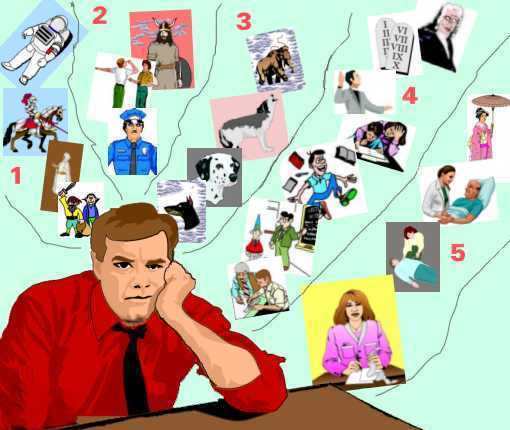This chapter is from The Road to Clear, Level Five.
The Time Track Illustrated
The Time Track Illustrated |
 |
Time Track: The recording in mental image pictures of the preclear's existence. The Time Track is a very accurate record of the pc's past, very accurately timed and very obedient to the auditor. If a motion picture film were 3 dimensional, had 55 perceptions and could fully react upon the observer, the Time Track could be called a motion picture film. "The content of the Reactive Mind could be reduced to being pictures." |
||||||||||||
|
What the illustration is supposed to show are different Chains of associated incidents going back in time. The Chains shown are numbered 1 to 5. The incidents in a Chain are held together by similar content. Example: "A time you felt pain in your shoulder" goes back to earlier times pc had the same pain in the shoulder. Chains are held together by (1) subject, like "A time you lost money"; or by (2) 'Somatic', meaning a body sensation, pain or emotion ("a time you felt sad", "a time you felt happy", "a time you had a stomach ache", "a time you felt sexual attraction"). The factors holding one Chain together are similar to a search criteria in a data base. You can 'search' - go earlier similar - on a specific Somatic or on Content and find the basic source of it - the first time it happened. The 55 perceptions mentioned under The Time Track were found and classified simply from what type of details many, many pc's in sessions were capable of recalling. When this was all added up the list below was put together. Pc's/Students will get a good understanding of this in Recall processes, such as the Self Analysis Lists. On Grade 5, Engram Clearing, the somatics Chains with painful and traumatic content are tracked down. They go way back in time and can be recalled and be re-experienced in great detail, leading to an As-is'ness of the pictures and the pains and misemotions, etc. contained in them. When this happens the Engrams and the Chain is said to be erased. The 55 perceptions that are recorded and are possible to recover in processing are:
Not all pc's will have all these perceptions available to them - especially not early on. The pc's ability to recall it or even re-experience or relive it in session will however develop during processing. Some pc's may have a 'shut-off' of one or more perceptions. This may be handled down the line. That does not mean, that this perception wasn't recorded at the time of the incident. The Time Track is peculiar in, that it responds real well and accurately to the auditor's command - like "Go to an incident containing (somatic or other content)" and "Go to an earlier incident containing (same somatic or same content)". Most of the Time Track is unknown to the pc. This part only seem to react on the pc - meaning not under his voluntary control. Instead the pc experiences this reactive part of his Time Track by the reactive pictures forcing their content on him as pains, upsets, emotional disturbances, strange ideas, odd behavior, etc. This collection of reactive pictures is also called the Reactive Bank. The common purpose of life and all its activities can be understood to be Survival. The original purpose and function of the Reactive Bank seem to have been to warn the pc about dangers and take over control to steer him out of danger; thus help him survive in critical situations.
The Bank is a warning
and control system. It sets aside the analytical mind and takes over -
like a surgeon
The way the Time Track responds is why the formula called Auditors Trust, is so important to successful auditing. Auditor plus the PC is greater than the Bank (Auditor+PC>Bank). The attempt of the Reactive Mind to control the individual with commands does not work in a complex world. The Bank's A=A=A type of thinking can cause a lot of mishaps, overreacting and repeating of bad incidents and the pc is a lot better off without his Reactive Bank.
|
|||||||||||||
© Clearbird Publishing, 2003, 2004.